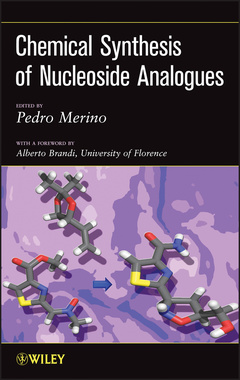Description
Chemical Synthesis of Nucleoside Analogues
Coordinator: Merino Pedro
Language: English
Subjects for Chemical Synthesis of Nucleoside Analogues:
912 p. · 15.8x23.6 cm · Hardback
Description
/li>Contents
/li>Biography
/li>
Compiles current tested and proven approaches to synthesize novel nucleoside analogues
Featuring contributions from leading synthetic chemists from around the world, this book brings together and describes tested and proven approaches for the chemical synthesis of common families of nucleoside analogues. Readers will learn to create new nucleoside analogues with desired therapeutic properties by using a variety of methods to chemically modify natural nucleosides, including:
- Changes to the heterocyclic base
- Modification of substituents at the sugar ring
- Replacement of the furanose ring by a different carbo- or heterocyclic ring
- Introduction of conformational restrictions
- Synthesis of enantiomers
- Preparation of hydrolitically stable C-nucleosides
Chemical Synthesis of Nucleoside Analogues covers all the major classes of nucleosides, including pronucleotides, C-nucleosides, carbanucleosides, and PNA monomers which have shown great promise as starting points for the synthesis of nucleoside analogues. The book also includes experimental procedures for key reactions related to the synthesis of nucleoside analogues, providing a valuable tool for the preparation of a number of different compounds.
Throughout the book, chemical schemes and figures help readers better understand the chemical structures of nucleoside analogues and the methods used to synthesize them. Extensive references serve as a gateway to the growing body of original research studies and reviews in the field.
Synthetically modified nucleosides have proven their value as therapeutic drugs, in particular as antiviral and antitumor agents. However, many of these nucleoside analogues have undesirable side effects. With Chemical Synthesis of Nucleoside Analogues as their guide, researchers have a new tool for synthesizing a new generation of nucleoside analogues that can be used as therapeutic drugs with fewer unwanted side effects.
Contributors ix
Foreword xiii
Preface xv
1 Biocatalytic Methodologies for Selective Modified Nucleosides 1
Miguel Ferrero, Susana Fern´andez, and Vicente Gotor
2 Nucleosides Modified at the Base Moiety 49
O. Sari, V. Roy, and L. A. Agrofoglio
3 Chemical Synthesis of Acyclic Nucleosides 103
Hai-Ming Guo, Shan Wu, Hong-Ying Niu, Ge Song, and Gui-Rong Qu
4 Phosphonated Nucleoside Analogues 163
Roberto Romeo, Caterina Carnovale, Antonio Rescifina, and Maria Assunta Chiacchio
5 Chemical Syntheses of Nucleoside Triphosphates 209
Lina Weinschenk and Chris Meier
6 Mononucleotide Prodrug Synthetic Strategies 229
Suzanne Peyrottes and Christian P´erigaud
7 Synthesis of C-Nucleosides 263
Omar Boutureira, M. Isabel Matheu, Yolanda D´ýaz, and Sergio Castill´on
8 Methodologies for the Synthesis of Isomeric Nucleosides and Nucleotides of Antiviral Significance 317
Maurice Okello and Vasu Nair
9 Synthesis of Conformationally Constrained Nucleoside Analogues 345
Esma Maougal, Jean-Marc Escudier, Christophe Len, Didier Dubreuil, and Jacques Lebreton
10 Synthesis of 3-Spiro-Substituted Nucleosides: Chemistry of TSAO Nucleoside Derivatives 427
Mar´ýa-Jos´e Camarasa, Sonsoles Vel´azquez, Ana San-F´elix, and Mar´ýa-Jes´us P´erez-P´erez
11 l-Nucleosides 473
Daniela Perrone and Massimo L. Capobianco
12 Chemical Synthesis of Carbocyclic Analogues of Nucleosides 535
E. Leclerc
13 Uncommon Three-, Four-, and Six-Membered Nucleosides 605
E. Groaz and P. Herdewijn
14 Recent Advances in Synthesis and Biological Activity of 4-Thionucleosides 655
Varughese A. Mulamoottil, Mahesh S. Majik, Girish Chandra, and Lak Shin Jeong
15 Recent Advances in the Chemical Synthesis of Aza-Nucleosides 699
Tom´as Tejero, Ignacio Delso, and Pedro Merino
16 Stereoselective Methods in the Synthesis of Bioactive Oxathiolane and Dioxolane Nucleosides 727
D. D’Alonzo and A. Guaragna
17 Isoxazolidinyl Nucleosides 781
Ugo Chiacchio, Antonino Corsaro, Salvatore Giofr`e, and Giovanni Romeo
18 Synthetic Studies on Antifungal Peptidyl Nucleoside Antibiotics 819
Apurba Datta
19 Chemical Synthesis of Conformationally Constrained PNA Monomers 847
Pedro Merino and Rosa Matute
Index 881
PEDRO MERINO, PhD, is the Director of the Department of Synthesis and Structure of Biomolecules of the Institute of Chemical Synthesis and Homogenous Catalysis at the University of Zaragoza. Dr. Merino has authored more than 200 publications, including several reviews and book chapters. His research spans asymmetric synthesis, target-oriented synthesis, organometallic chemistry, and asymmetric metal-assisted and organic catalysis. Recently, he has been investigating the use of computational chemistry to better understand reaction mechanisms.




